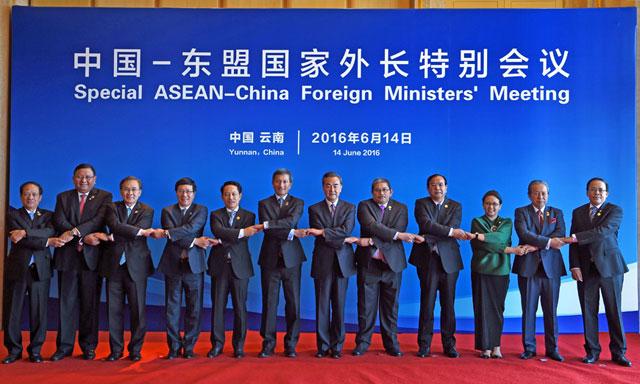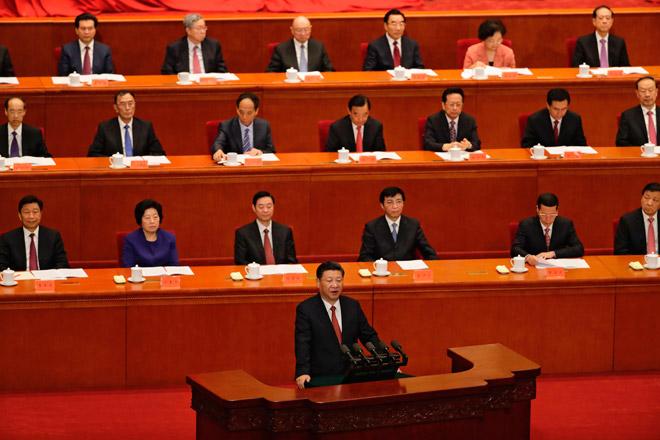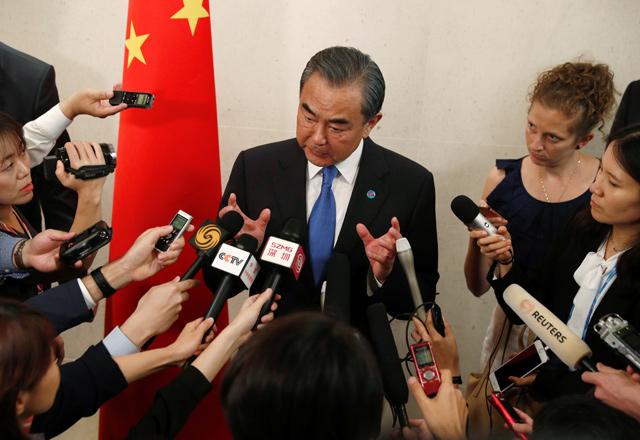You are here
‘Serious concerns’ over South China Sea — ASEAN ministers in China
By AFP - Jun 14,2016 - Last updated at Jun 14,2016

Chinese Foreign Minister Wang Yi (6th right) and foreign ministers from ASEAN-member nations pose for a group photo during a special ASEAN-China foreign ministers’ meeting in Yuxi, southwest China’s Yunnan Province, on Tuesday (AFP photo)
BEIJING — Countries in Southeast Asia have “serious concerns” over recent events in the disputed South China Sea, an unusually strongly worded communique issued by their foreign ministers in China said Tuesday.
In a rare diplomatic slap in the face for Beijing — issued on its own territory — the Association of Southeast Asian Nations (ASEAN) offered a sharp rebuke over China’s actions in the waterway.
“We expressed our serious concerns over recent and ongoing developments, which have eroded trust and confidence, increased tensions and which may have the potential to undermine peace, security and stability in the South China Sea,” its communique said without mentioning China by name.
China claims nearly all of the South China Sea — a vast tract of water through which a huge chunk of global shipping passes.
It has bolstered its claim by building artificial islands including airstrips in the area, some of which are suitable for military use.
The Philippines, Taiwan, Brunei, Malaysia and Vietnam have competing claims to parts of the sea, which is believed to harbour significant oil and gas deposits.
The ASEAN statement, which speaks of “a candid exchange with Chinese Foreign Minister Wang Yi” — diplomatic talk for a row — was forthright on the dangers of this island-building programme.
“We emphasised the importance of non-militarisation and self-restraint in the conduct of all activities, including land reclamation, which may raise tensions in the South China Sea,” the communique said.
“We stressed the importance of maintaining peace, security, stability, safety and freedom of navigation in and overflight above the South China Sea, in accordance with universally recognised principles of international law including the 1982 United Nations Convention on the Law of the Sea (UNCLOS).”
The bloc’s finger-wagging, after a Special ASEAN-China foreign ministers’ meeting in Kunming, comes as the region braces for a ruling by a UN tribunal on a claim brought by the Philippines against China.
China does not recognise the arbitration and has reacted angrily to the Philippines’ legal efforts over the Beijing-controlled Scarborough Shoal, off the main Philippine island of Luzon.
“We articulated ASEAN’s commitment to maintaining and promoting peace, security and stability in the region, as well as to the peaceful resolution of disputes,” the statement said.
The includes “full respect for legal and diplomatic processes, without resorting to the threat or use of force, in accordance with universally recognised principles of international law, including the UNCLOS and the UN Charter”.
China has been roundly criticised in the international community for its strong-arm tactics in both the South China Sea and the East China Sea.
Washington has repeatedly cautioned Beijing to exercise restraint in the region, and has sent warships through the waters on designated “Freedom of Navigation” missions.
It has also chided the Asian giant in recent weeks over what it says are “unsafe” intercepts of US spyplanes by Chinese fighter jets.
Beijing, which claims almost all of the South China Sea on the basis of a “Nine Dash Line” found on Chinese maps dating to the 1940s, says it will not budge.
China’s stance on the sea is “in line with international law”, its top diplomat Yang Jiechi said last month, insisting his country’s position “will not change”.
A regional analyst said Tuesday’s statement was a show of support for Manila.
“Clearly, China’s purported efforts to divide and conquer the region and extract the South China Sea issue from the ASEAN-China agenda hasn’t worked,” said Richard Javad Heydarian, assistant professor in international affairs and political science at Manila’s De La Salle University.
“And in this sense it’s an encouraging sign of consensus and support for the Philippines.”
Heydarian predicted a ruling favourable to the Philippines from the tribunal in The Hague, and said it would be important for ASEAN to issue a supportive statement as soon as the decision was announced.
“This will augment diplomatic pressure on China and help the Philippines and other claimant states have better negotiating power in bilateral dealings,” he told AFP
Related Articles
MANILA — Southeast Asian ministers meeting this week are set to avoid tackling the subject of Beijing's arming and building of manmade South
VIENTIANE, Laos — China scored an unequivocal diplomatic victory Monday, preventing Southeast Asia's main grouping from criticising it for t
SINGAPORE — China wants military exercises and energy exploration with Southeast Asian nations in disputed waters, according to a draft docu



















